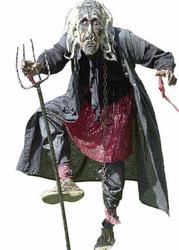
Jonkunnu has re-emerged as the Jamaican face of Christmas.
- Ricardo Makyn Staff photographer
A familiar memory that many Jamaicans share about Christmas time is running from a 'Horse head', 'Belly woman' or other characters in a 'Jonkunnu' band as they made their way through towns across the island.
For many, this may have been a thrilling exercise, but for others it still conjures up frightful feelings.
'Jonkunnu' or 'John Canoe' is a traditional Jamaican dance of African origin with a strong focus on the signature characters associated with the art form. In the past, the dance was performed solely by all males, who would wear costumes to depict their particular character (some of which are female); today, however, many females have become involved in its performance.
The dance is accompanied by a distinctive type of music that combines the fife and the 'rattling drum'. This is often performed by the costumed group.
The custom of Jonkunnu dates back as far as the late 18th century, when Christmas was a major holiday for the slaves. The tradition was at first encouraged by slave owners, but soon after was banned for fear of uprising and rebellions.
Eradicate amusements
After Emancipation in 1838, Jonkunnu suffered a sharp decline as the churches combined to eradicate pagan amusements and rituals and the worst came with the 'John Canoe Riots' of 1841, when the mayor of Kingston banned its performance.
Jonkunnu has been kept alive today in many rural parts of the island and is still performed to a lesser degree in some communities.
Several efforts have been made by the Jamaica Cultural Development Commission to ensure its preservation, which include the hosting of the National Festival of the Performing Arts and the annual Children's Jonkunnu Festival, which sees children from across the island being immersed in the art form.
See Traditional Jonkunnu and enjoy other delightful aspects of Jamaican Christmas, this Sunday, December 9 at the Ranny Williams Entertainment Centre.

